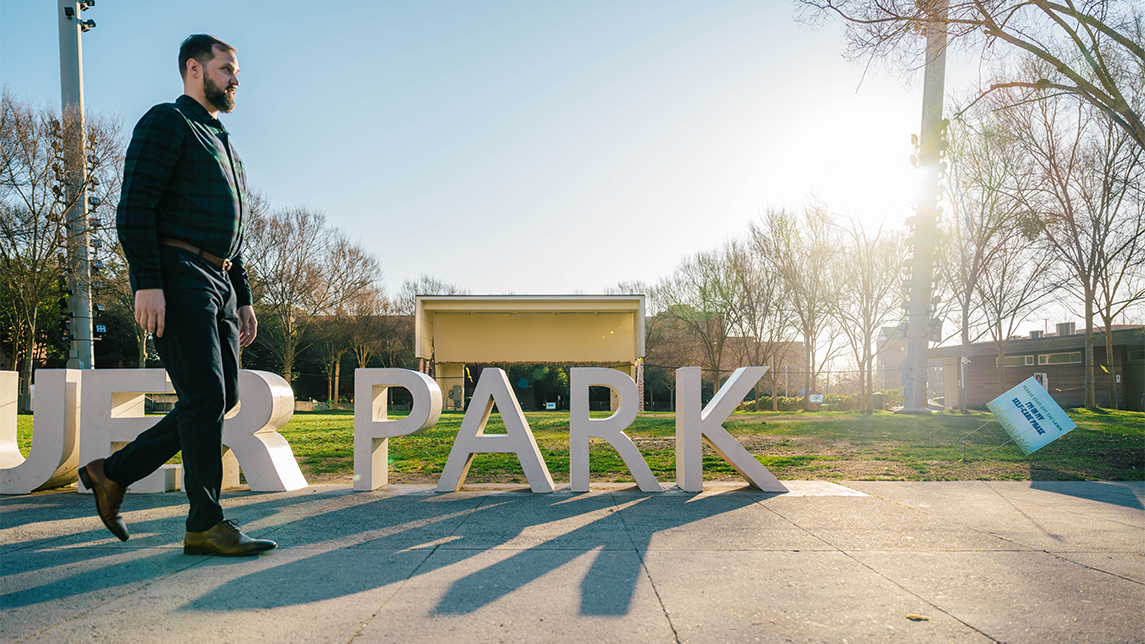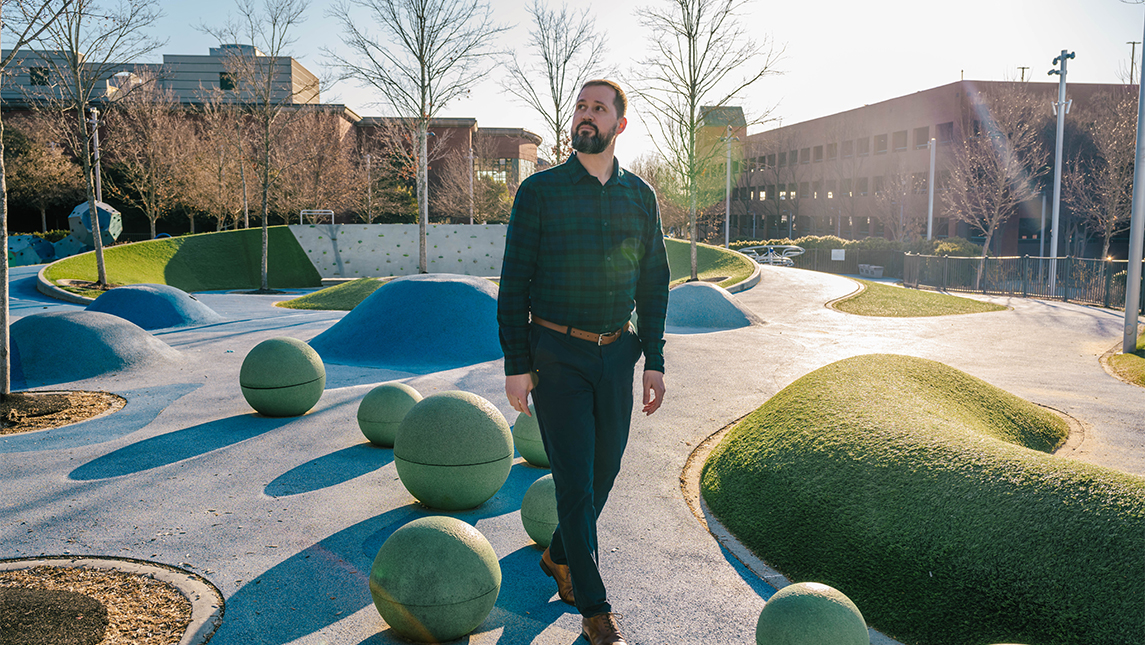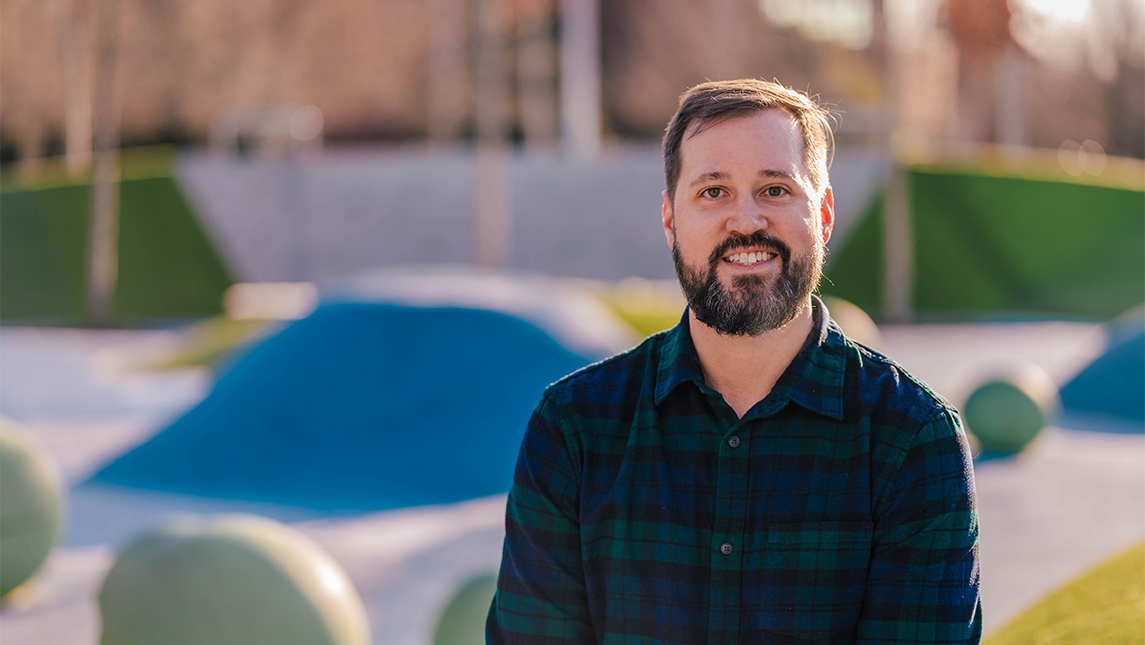As a teenager in Illinois, Benjamin Hickerson worked just about every job he could in public parks, including cutting the grass, refereeing sporting events, and helping in the front office.
Across these roles, he adopted an unofficial title: people watcher.
“It was fascinating to see so many people coming to the same park with so many different ideas of what they were going to do there,” he says. “Watching people always provided me with new fodder to consider.”
Now, as an associate professor in the Department of Community and Therapeutic Recreation, Dr. Hickerson turns his fascination with park users into social science research. He’s particularly interested in people’s perceptions of the purposes of public parks.
“We’re trying to figure out how to empower everyone through the development of parks and make sure everybody’s interests are in mind,” Hickerson says.
Public Perspective on Parks
Hickerson’s recent research centers on public attitudes toward people experiencing homelessness who are using the park for personal needs, including shelter. This is a timely topic, as the number of people experiencing homelessness who are seeking shelter in public places, known as unsheltered homelessness, has increased across the U.S.
“People have varying opinions about whether that’s acceptable or not, and this has been a big topic in the city of Greensboro,” he says.
Hickerson’s goal is to better understand people’s perspectives towards parks and recreation providing housing support, such as connecting people experiencing homelessness with permanent housing, and service-related assistance, such as providing free meals.
With colleagues Dr. Lauren Mullenbach and Dr. Nick Pitas, Hickerson conducted a national survey of 952 individuals, the majority of whom were park users. The survey was funded by a UNCG School of Health and Human Sciences Faculty Research Grant.
The scientists found that younger people, regular park users, and more affluent individuals are in general, more favorable toward agencies providing a variety of housing and service-related support. People had the highest level of agreement with the following actions: providing temporary shelter at parks during adverse weather, allowing access to bathrooms for hygiene during specific times, and connecting those living in parks with resources.

Hickerson and his colleagues explored why people may differ in their attitudes. Among their findings, they found that people who have had positive experiences with people experiencing homelessness, and who had experienced homelessness themselves, were more likely to support agencies taking action to help these individuals.
The team published these findings in both the Journal of Park and Recreation Administration and International Journal of Public Administration. They also shared their findings with the National Recreation and Park Association, which disseminates data to park leaders across the country.
“I really love this topic. It’s basic, but it’s the essence of what we wanted to do,” Hickerson says. “If I’m a park director, and I want to figure out how I can play a role in providing services to people experiencing homelessness, what are studies saying?”
Training future park leaders
Hickerson was a business major in college who had no idea his current field was a career option.
“I spent all this time working in parks and didn’t even realize that this was a profession, and I think that’s true for a lot of people,” he says. “They often overlook the importance of parks and recreation services to any audience.”
At UNCG, Hickerson is motivated to help educate future leaders, especially in a city that has such diversity in its parks and residents. Students in his Parks and Health course analyze a Greensboro census tract and propose potential park-related improvements, such as renovations or new buildings, that could aid the community.
“It’s been really cool to have a living environment that myself and my students can go into and observe and come up with real-world solutions that are hopefully going to be employed in the future,” he says.
Hickerson hopes these students, many who are the first of their families to attend college, may take the lessons they learn in these courses back into their home communities.
“They’re going to be advocates of parks and recreation wherever they go,” he says. “The principles they’re learning aren’t just for quizzes – they’re for life.”
As for Hickerson, he says he feels grateful his path has led him to UNCG.
“One of the things I love about UNCG is the integration of the University and the community,” he says. “One reason I came here was because I knew there were things to consider in parks that will really help people.”
Story by Rachel Damiani
Photography by Sean Norona, University Communications




